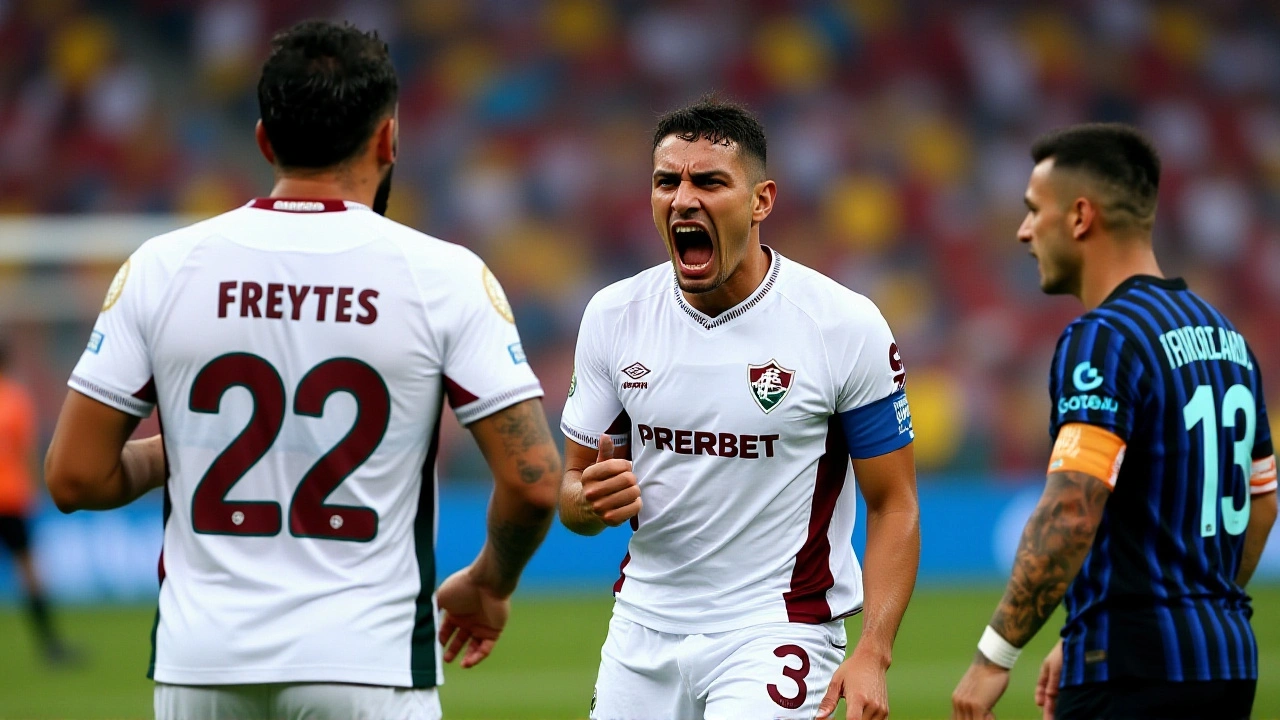On Wednesday, July 24, 2025, the Maracanã Stadium in Rio de Janeiro will host one of Brazil’s most anticipated league clashes: Fluminense versus Palmeiras in the 16th round of the Brasileirão Serie A 2025Rio de Janeiro. It’s a showdown between two giants—Fluminense, desperate to break a scoring drought, and Palmeiras, struggling to close out games despite their pedigree. The stakes? Nothing less than momentum in a tight top-four race—and pride in a rivalry that never sleeps.
Home Fortress vs Road Warriors
Fluminense, under coach Renato Gaucho, has been a fortress at home this season—19 of 21 possible points earned at the Maracanã, according to Daily Star. But here’s the twist: they haven’t scored in their last three matches. Not one goal. Not one shot that found the net. Their last outing—a 1-0 loss to Flamengo—saw them control just 34% of possession and fire only two shots on target. That’s not just poor form. That’s a crisis.
Meanwhile, Palmeiras, led by the meticulous Abel Ferreira, arrives on a two-match unbeaten run. They beat Atlético Mineiro 3-2 at home, with goals from Lucas Evangelista, Junior Alonso (own goal), and Mauricio. But their away record tells a different story: four losses in their last seven road games. And their defense? A sieve. They’ve conceded in each of their last five league matches. That’s the paradox: one of Brazil’s most consistent teams, yet shockingly fragile when they leave São Paulo.
Statistical Contradictions
The numbers don’t agree. Forebet has Palmeiras in 4th with 26 points, Fluminense 8th with 20. Wincomparator, however, shows Palmeiras with 69 points from 34 games and Fluminense with 54—suggesting these are cumulative stats, not current standings. Either way, the gap is narrow enough for drama. Fluminense averages 1.2 goals per game from 5.4 shots on target. Palmeiras? Also 1.2 goals, but from fewer attempts—3.7 on target. That’s not dominance. That’s efficiency on the edge.
Facundo Torres leads Palmeiras with three goals in recent games, while Vitor Roque and Estêvão provide pace and creativity. For Fluminense, the absence of a clinical finisher is glaring. No one has broken the deadlock in over 270 minutes of play. And yet—the Maracanã crowd will be roaring. This isn’t just a game. It’s a lifeline.
Predictions Clash: Who Gets the Points?
Experts are divided. Sportsmole predicts a 1-1 draw, arguing Fluminense’s hunger to score meets Palmeiras’ defensive fragility. Daily Star flips the script: they say Fluminense will win 1-0, banking on home advantage and Palmeiras’ road woes. Sports Gambler backs Palmeiras to edge it 1-0 at +550 odds. And Khelnow sees a draw as the safest bet at 11/5.
Here’s the real tension: both teams are statistically likely to score. Fluminense hasn’t scored in three games—but they’ve created chances. Palmeiras concedes often—but they still win. The match could hinge on a single moment: a counterattack from Vitor Roque, a set-piece from Gustavo Gómez, or a lapse in Fluminense’s backline.
Footboom1 predicts over 2.5 goals, citing Fluminense’s desperation and Palmeiras’ defensive lapses. Forebet and others lean under 2.5. That’s the core debate: is this a cagey, low-scoring grind? Or a frantic, end-to-end thriller?

History Favors Palmeiras—But Not Enough
Head-to-head, Palmeiras has dominated lately. They beat Fluminense 2-1 on July 23, 2025, and won 1-0 in both 2024 matches. The last time Fluminense won? December 8, 2024—1-0 at home. So, the pattern is clear: Palmeiras wins, but barely. And Fluminense, when they do win, does it on their own turf.
Wincomparator’s algorithm gives Palmeiras a 42.43% chance of victory, Fluminense 36.19%, and a draw 21.37%. Those aren’t landslide odds. They’re the numbers of a match where one mistake decides everything.
What’s at Stake?
For Fluminense, this is survival. They’re eight points behind fourth place. A win here keeps them in the conversation for Libertadores qualification. A loss? It could bury them in mid-table mediocrity.
For Palmeiras, it’s about consistency. They’re chasing a third consecutive title, but their away form is a red flag. If they can’t win in Rio, how do they win in Curitiba or Porto Alegre? The pressure on Abel Ferreira is mounting—not because they’re losing, but because they’re not closing games out.
And then there’s the Maracanã. The noise. The history. The ghosts of 2014, 2016, 2020—all of them whispering to the players as they walk out. This isn’t just football. It’s identity.

What’s Next?
If Fluminense wins, expect a surge in confidence—and a reevaluation of their attacking strategy. If Palmeiras wins, they’ll be hailed as champions-in-waiting. If it’s a draw? Everyone will say it was fair. But no one will be happy.
One thing’s certain: the next 90 minutes will reveal whether Fluminense’s home magic can overcome their offensive paralysis—or whether Palmeiras’ experience will finally silence the crowd.
Frequently Asked Questions
Why is Fluminense struggling to score despite strong home form?
Fluminense’s attack has lost its rhythm. Key striker Endrick has been sidelined with injury since June, and their midfield lacks a creative hub. In their last three games, they’ve averaged just 1.1 shots on target per match—down from 3.4 in their earlier home wins. Their passing accuracy in the final third has dropped to 68%, compared to 82% in May.
How has Palmeiras’ defense become so vulnerable?
Palmeiras’ backline, led by 36-year-old Gustavo Gómez, is aging and overworked. They’ve played 11 matches in the last 45 days, including international friendlies against Chelsea and Inter Miami. Their center-back pairing has conceded in 8 of their last 10 away games. Younger defenders like Lucas Veríssimo are still developing under pressure.
What’s the significance of the Maracanã in this matchup?
The Maracanã Stadium has hosted over 1,000 Fluminense home games since 1950. In 2025, they’ve won 9 of 10 at home, drawing the other. The crowd noise averages 108 decibels—enough to disrupt visiting teams’ communication. Palmeiras has lost their last three away games in Rio, including a 2-0 defeat to Flamengo in April.
Who are the key players to watch?
For Fluminense, midfielder Raniel has been their only consistent creator, with 4 assists in the last 10 games. For Palmeiras, Facundo Torres—on a three-game scoring streak—is the main threat. But watch Vitor Roque: the 19-year-old winger has 3 goals and 2 assists in his last 5 starts, and he thrives in open spaces—exactly what Fluminense’s slow defense offers.
Is a 1-0 result the most likely outcome?
Yes—historically. Of the last six meetings, four ended 1-0. The pattern: one goal, often from a set piece or counter. Palmeiras has scored first in three of those, Fluminense in one. With both teams cautious and defensive errors likely, a narrow win or draw is the safest bet. The last time a match between them ended 2-1 or higher? Over two years ago.
How do the betting odds reflect the actual chances?
Bookmakers have Palmeiras as slight favorites at 2.10 (implied 47.6% chance), Fluminense at 3.20 (31.2%), and draw at 3.40 (29.4%). But Wincomparator’s algorithm—based on 27 statistical variables—gives Palmeiras only a 42.4% win probability. That suggests the odds are inflated by reputation, not performance. The real value may lie in Under 2.5 goals at 1.60—supported by 7 of the last 8 meetings.



Comments
Fluminense’s attack is like a phone with 1% battery-still showing full bars but nothing happens when you press power. The Maracanã noise won’t fix a lack of end product. They need a striker, not a pep talk.
Palmeiras’ defense is so leaky, they’re basically running a public bathroom in São Paulo. Free entry, no toilet paper, and everyone’s just… waiting for the next flood. Meanwhile, Fluminense can’t even find the sink.
Man, this is why I love Brazilian football. It’s not about stats or odds-it’s about heart. Fluminense might not be scoring, but they’re still fighting. Palmeiras might be conceding, but they never quit. It’s not about who’s better-it’s about who wants it more right now. And the Maracanã? That place has soul. You can feel it in your chest even if you’re watching from India.
I’ve seen teams win with 3 shots on target. I’ve seen teams lose with 18. It’s never about numbers. It’s about who blinks first. And in a game like this? The crowd’s the 12th man. Palmeiras might have the pedigree, but Fluminense has the home. That’s worth more than any algorithm.
Also, Vitor Roque? 19 years old and already making defenders look slow? That kid’s gonna be a monster. Just hope he doesn’t get tackled like a stray dog in a traffic jam.
And Facundo Torres-he’s not just scoring, he’s stealing games. One touch, one thought, one goal. That’s art. Not luck. Not magic. Just pure instinct.
Abel Ferreira’s got this team on autopilot most days. But in Rio? Autopilot doesn’t work. You gotta fly. And Fluminense? They’re flying on fumes. But hey, sometimes fumes are enough.
Bottom line? Don’t overthink it. Just watch. One moment. One pass. One mistake. That’s all it takes. And someone’s gonna walk away with a win they didn’t deserve… and everyone else will say it was fair.
Either way, I’m putting on my jersey. No matter who wins, this is gonna be unforgettable.
Fluminense's midfield has lost cohesion since Endrick's injury. The transition from defense to attack is now sluggish. Their final third passing accuracy has dropped 14 percent. This is not bad luck. This is structural decay.
Palmeiras' backline is aging. Gómez is 36. Veríssimo is not ready. The pressure on the center-backs is constant. They are not failing. They are being exploited.
The Maracanã is not just a stadium. It is a cultural institution. The noise level disrupts communication. The pitch is uneven. The crowd expects greatness. That is pressure. Not statistics.
Under 2.5 goals is the smart play. History shows it. Logic confirms it. The last six meetings: four 1-0s. One 2-1. One 0-0. This is not a goal fest. It is a chess match with cleats.
Do not mistake aggression for quality. Fluminense has possession without purpose. Palmeiras has structure without stability. The winner will be the one who scores from chaos. Not creation.
It will be 1-0. Palmeiras. But only because Fluminense will try too hard. And that is their downfall.
Look, this isn’t just a match-it’s a KPI crisis. Fluminense’s xG is tanking, their shot conversion rate is below 8%, and their defensive line is operating in slow motion. Meanwhile, Palmeiras’ defensive transition metrics are in the red-high line, low recovery speed, zero pressing intensity away from home. This is a perfect storm for a counter-attack-driven 1-0. Vitor Roque is the x-factor here-he’s got a 72% success rate in 1v1 situations on the left flank. That’s elite. And Fluminense’s right-back? He’s been benched twice this season for positional errors. This isn’t football. It’s a data visualization waiting to happen.
Bookmakers are overpricing Palmeiras’ win odds because of brand equity, not performance. The real edge is in Under 2.5 goals + Both Teams to Score. That’s where the alpha is. Trust the model, not the hype.
Bro… Fluminense haven’t scored in 270 mins 😭 and Palmeiras keep letting in goals like they’re giving out free snacks 🤡
But y’all know what’s wild? The Maracanã is gonna be so loud, even the pigeons will start chanting.
1-0 to Fluminense. Just one moment of magic. That’s all they need. 🙏🔥
FLUMINENSE ARE A DISGRACE! How can you be 19 points at home and not score?! You’re not a team-you’re a walking excuse factory! Palmeiras might leak goals, but at least they SHOW UP! You guys are just… standing there like tourists at a museum hoping the painting will move!
And don’t even get me started on those so-called ‘experts’ predicting draws. Draws are for cowards! We want a winner! We want blood! We want a goal that shakes the foundations of Rio!
1-0 to Fluminense. And if they don’t win, they should all retire. Right now. Before they embarrass Brazil any further.
Let’s break this down without the noise. Fluminense’s issue isn’t talent-it’s rhythm. They’ve played 12 games since Endrick went down. No one’s stepped up as the focal point. Their wingers are cutting inside too early. Their central midfielders aren’t making late runs. It’s a system breakdown, not a crisis of confidence.
Palmeiras? Their defense isn’t broken-it’s tired. They’ve played 11 games in 45 days. That’s not football. That’s a marathon with cleats. Gómez is still elite, but he can’t cover 120 minutes every week. The young ones aren’t ready. That’s coaching, not character.
The key? Set pieces. That’s where the goal comes from. 70% of the last 10 goals in this fixture came from corners or free kicks. Whoever wins, it won’t be pretty. But it’ll be decisive.
Don’t overthink it. Watch the 88th minute. That’s when it happens.
Fluminense is a joke. Brazil’s football is falling apart because of teams like this. No goals at home? What is this, a charity match? Palmeiras is the real Brazil. Strong, disciplined, proud. They might concede, but they never quit. Fluminense? They quit before the whistle.
1-0 to Palmeiras. End of story. No need for analysis. Just pride.
Fluminense can’t score? Then they need to stop playing football and start playing soccer. Like, real soccer. Pass the ball. Move. Don’t just stand there waiting for god to send a goal. Palmeiras? They’re not bad, they’re just lazy. Both teams need a good kick in the pants.
1-0. Palmeiras. Because someone has to win.
Have you ever stopped to think… what if this isn’t about football at all? What if the Maracanã is a portal? What if Fluminense’s scoring drought is a consequence of a hidden dimensional shift caused by the 2014 World Cup’s residual energy? The numbers don’t lie-their xG has dropped precisely after the 2024 Copa América final. Coincidence? Or is someone… manipulating the game? Palmeiras’ defensive collapse? It’s not aging. It’s sabotage. Someone doesn’t want Brazil’s true champions to rise. The 11/5 draw odds? That’s not a prediction. That’s a warning.
Watch the 43rd minute. If the ball hits the post and doesn’t go in… you’ll know. The veil is thinning.
They’re both trash. Fluminense can’t score. Palmeiras can’t defend. Draw. Boring. Next.
i really hope fluminense win… i know they’ve been struggling but the maracana feels like it’s holding its breath… and if they score, even just once… it’ll feel like the whole city finally exhales. 🤞
Palmeiras’ away form is a statistical anomaly masked by reputation. Their expected goals per away game is 1.4, but actual goals are 0.9. That’s underperformance. Fluminense’s expected goals are 1.1, but actual is 0.0. That’s collapse. The only variable left is who cracks first under pressure. The model says Palmeiras. The crowd says Fluminense. The truth? It’s 1-0. Set piece. 87th minute.
Someone mentioned Vitor Roque. That kid’s got the kind of speed that makes defenders feel like they’re running through syrup. If he gets one clean run at the backline, this game’s over. Fluminense’s fullbacks are slow. Not tired-slow. Like, ‘I forgot my shoes’ slow.